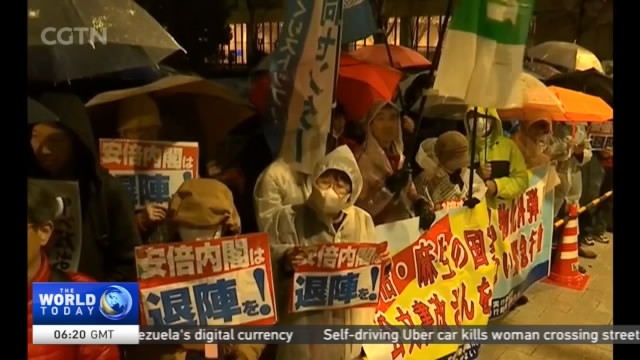
15:23, 20-Mar-2018
Japan PM Scandal: Abe denies involvement in school scandal cover-up

Japan's embattled prime minister, Shinzo Abe, is denying he ordered changes to documents relating to a controversial land sale. The deepening cronyism and document-tampering scandal has hit Abe hard, as his popularity plunges to historic lows. Omar Khan has the story.
In a statement in parliament on Monday, Shinzo Abe stressed he had not ordered bureaucrats to alter documents related to a controversial land sale.
The scandal surrounds the 2016 sale of state-owned land to a nationalist operator of schools who claims ties to Abe and his wife Akie. The sale was clinched at a price well below market value amid allegations that high-level connections helped grease the deal. The affair first emerged early last year, but resurfaced after the revelation that official documents related to the sale had been changed.
Finance ministry officials last week admitted to removing references to Mr Abe, his wife and Finance Minister Taro Aso in some documents relating to the sale.
Finance Minister Taro Aso, also deputy prime minister, said that a few officials in the ministry's financial bureau altered the documents without Abe's knowledge.
The prime minister repeated an apology Monday, saying he "keenly felt" his responsibility over the scandal that has "shaken people's confidence in government administration."
But the opposition parties and the public said Abe's testimony is not convincing and requested Abe's cabinet to resign. The Budget Committee of House of Councillors of Japan failed to summon the key figure of the scandal, National Tax Agency chief Nobuhisa Sagawa to parliament to testify on Monday. The opposition party has requested the Committee to make a decision on Tuesday.
A survey by the Asahi Shimbun showed that the cabinet's approval rate has plunged to 31 percent. Experts pointed out that the protracted scandal could seriously dampen Abe's chances of securing a third term as Liberal Democratic Party President and in turn his chances of becoming the longest-serving prime minister in post-war Japan.

SITEMAP
Copyright © 2018 CGTN. Beijing ICP prepared NO.16065310-3
Copyright © 2018 CGTN. Beijing ICP prepared NO.16065310-3